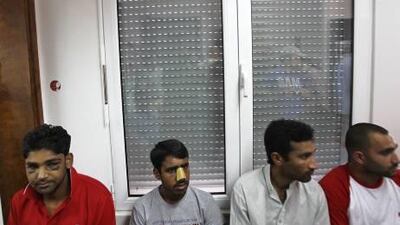ATHENS // As he does every night, Mohammad Zaffari, a neat and sprightly 65-year-old from Afghanistan, was picking through rubbish in a skip in central Athens when the fascists attacked him.
"They asked me where I was from, but before I could answer they were beating me until I was almost unconscious," he said through an interpreter. "There were around 10 or 15 in the group - most of them teenagers, the oldest around 25."
He claims one of the gang proudly stated their allegiance to Golden Dawn, the neo-Nazi party that won 18 seats in last Sunday's election.
The police came and the gang dispersed. There were no arrests. The first thing the police said to Mr Zaffari as he lay groaning on the ground was: "Show us your papers."
Greece has seen a sudden surge in immigration. It now handles more than 80 per cent of the illegal migration into Europe - up from 25 per cent only four years ago - as tighter security has closed off alternative routes and the landmines that once dotted the border with Turkey have been removed.
There are an estimated half a million illegal immigrants in Greece, and between 150 and 200 more arrive every day, escaping poverty, conflict and political persecution in countries such as Pakistan, Afghanistan and Iran.
And this is happening in the middle of the worst economic crisis in recent Greek history - a deadly coincidence that has fostered an outpouring of racial hatred. Anti-immigrant parties across Europe are exploiting the economic downturn to increase support, but in Greece the situation is extreme: dozens of nightly attacks on minorities, growing networks of fascists in schools and impoverished areas, a foothold for Golden Dawn in parliament, and a political elite either unwilling or unable to confront it.
In a grotty apartment down a rough-looking side street in central Athens, 22 Afghans live in three cramped rooms lined with tatty carpets. Two junkies are loading up needles on the step outside. The windows are boarded up so that fascists cannot see in.
"We are afraid to go out at night. If we cross the road, we will be attacked," said Abdul Rahim Atai, a 52-year-old who fled his home in Wardak province, Afghanistan earlier this year after the Taliban attacked his village and killed his six-year-old daughter.
His journey here was arduous, involving 15 or 20-hour walks across borders with his disabled 17-year-old son on his back. He is trying to reach Germany, where he hopes to find work and medical treatment for his boy. His wife has made it already, but the US$40,000 (Dh146,900) Mr Atai raised from selling all the family's possessions has run out. He needs $8,000 more to get him and his son through the final leg - an impossible sum.
For now, he is trapped in Greece, picking through rubbish to find items for sale, queuing three times a day at the local church for meals.
"We heard on TV that Europe was a place of human rights, where we could find help, but there is nothing in Greece," said Mr Atai. Volunteers working with Afghan refugees say dealing with the psychological disappointment of newcomers is one of their primary tasks.
Golden Dawn rejects the neo-Nazi label and says it is not involved in any of the street attacks. But its promises to expel all foreigners, its promotion of Aryan supremacy and the swastika-like symbol on its flag, suggest a different view.
A spokesman for the party, Ilias Kasidiaris, recently slapped a Communist candidate live on air during a heated pre-election debate. One of its senior leaders vowed that the party would drag immigrants out of hospitals and nursery schools to make room for Greeks.
"I am doing the same thing I used to do for the Red Cross in Afghanistan - drawing up maps with no-go areas and safe zones," said Mohammad Younos, who runs a migrant support group in Athens.
Many hoped Golden Dawn's success in the inconclusive May elections - when it took 6.97 per cent of the vote - would be a flash in the pan, a protest vote directed against the political elite. But last weekend's results showed their tally barely changed at 6.92 per cent.
Part of the problem is a tacit acceptance of anti-immigrant sentiment among some of the established parties. Activists accuse the centre-right New Democracy party, which won last week's election, of obstructing attempts to ban hate-speech. The country's new prime minister, Antonis Samaras, has vowed to overturn legislation giving citizenship to second-generation migrants.
Although it is impossible to confront the fascists in the streets, some are at least taking the fight to schools, where Golden Dawn builds support by handing out food and sponsoring sporting events.
A network of African migrants called 'Asante' has visited 30 schools with well-known TV and music stars, organising plays and workshops to try to change opinions.
"At the start the children would ask questions like 'Why are you trying to destroy the Greek race?' or 'Why do you steal our women?'", said organiser Nikodemus Maina Kinyua, 35, who migrated from Kenya as a child. "But by the end, we've had kids who joined Golden Dawn saying they no longer believe in the ideology."
With far-right groups on the rise across Europe, activists say it is worth remembering that many people still reach out to help immigrants.
"Even as Greeks are facing so many problems, we are receiving more clothes and food for our centres than before," said Mr Younos. "Most Greek people are good."
Follow
The National
on
& Eric Randolph on

